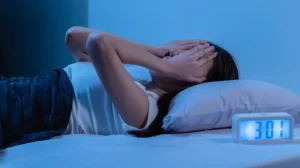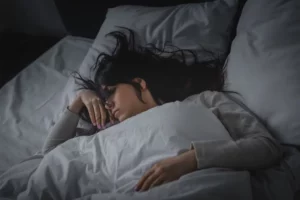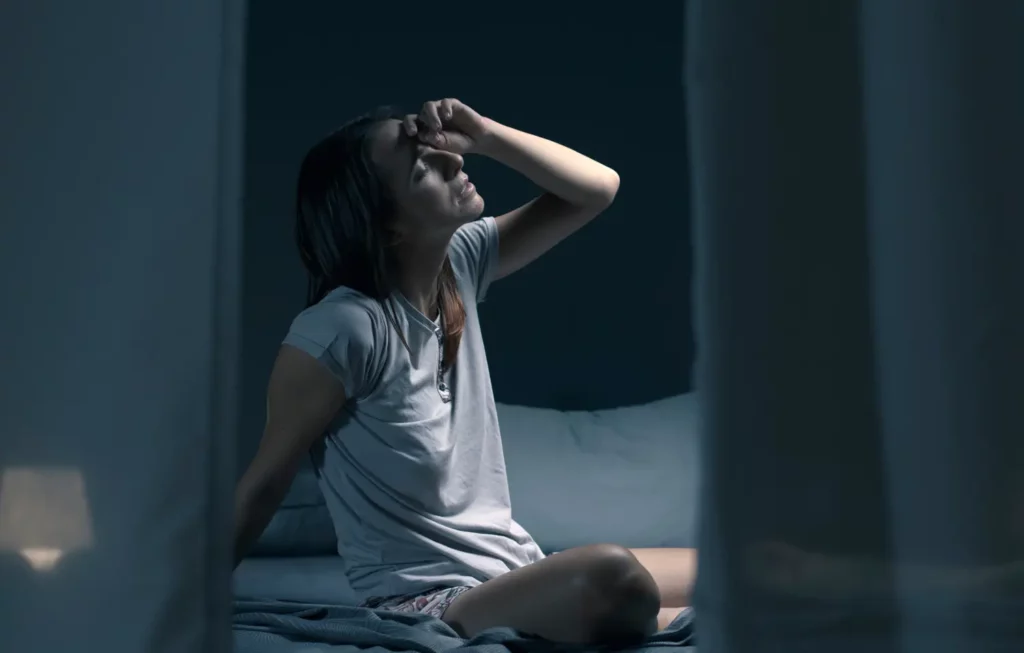Menopause, a natural phase in a woman’s life, brings about a myriad of changes, both physical and emotional. One of the most challenging symptoms that many women face during this time is night sweats. These episodes of excessive sweating can disrupt sleep, affect overall well-being, and create a sense of discomfort. In this comprehensive guide, we will explore the best medications that can offer immediate relief from night sweats during menopause.
Contents
Causes of Night Sweats During Menopause
 Night sweats during menopause are intricately linked to hormonal changes, particularly those related to reproductive hormones such as estrogen and progesterone. These hormonal fluctuations can induce unpleasant shifts in your body temperature, making you feel excessively hot. Understanding the specific causes can shed light on the nature of night sweats:
Night sweats during menopause are intricately linked to hormonal changes, particularly those related to reproductive hormones such as estrogen and progesterone. These hormonal fluctuations can induce unpleasant shifts in your body temperature, making you feel excessively hot. Understanding the specific causes can shed light on the nature of night sweats:
- Reproductive Hormones: Hormonal imbalances, notably the decline in estrogen and progesterone levels, disrupt the body’s thermoregulation process. This disturbance triggers rapid changes in body temperature, leading to the onset of night sweats.
- PMS and PMDD Connection: While symptoms like irritability and cramps are more commonly associated with premenstrual syndrome (PMS) and premenstrual dysphoric disorder (PMDD), night sweats can also manifest during these hormonal fluctuations. The overlap in symptoms underscores the intricate relationship between reproductive hormones and the body’s response to temperature changes.
- Neurotransmitter Involvement: Hormonal changes can impact neurotransmitters in the brain, affecting the body’s ability to regulate temperature. This interaction between hormonal shifts and neurotransmitters contributes to the occurrence of night sweats.
- Individual Variability: Every woman’s experience of menopause is unique. Factors such as genetics, overall health, and lifestyle choices can influence the degree to which hormonal changes impact the occurrence and intensity of night sweats.
Understanding these causes not only demystifies the origin of night sweats but also forms the foundation for effective management strategies.
Impact Of Night Sweats

- The frequency and severity of night sweats can vary widely among women experiencing menopause. Some may only experience occasional mild episodes, while others may endure frequent and intense sweating throughout the night.
- The impact of night sweats on sleep quality cannot be overstated.
- As these episodes disrupt the sleep cycle, individuals often find themselves waking up drenched in sweat, leading to discomfort and difficulty falling back asleep.
- The cumulative effect of disrupted sleep can result in daytime fatigue, irritability, and a decreased overall quality of life.
- Moreover, persistent sleep disturbances can contribute to more significant health issues, including increased stress levels, impaired cognitive function, and a weakened immune system.
Recognizing the profound impact of night sweats on sleep underscores the importance of addressing and managing this symptom during the menopausal transition.
Other Causes of Night Sweats
While hormonal changes related to menopause are a primary cause of night sweats, it’s essential to recognize that various medical conditions unrelated to menopause can also contribute to these episodes. Understanding these additional causes broadens our perspective on night sweats and prompts a comprehensive approach to their management.
- Infectious Diseases:
- Tuberculosis (TB): This bacterial infection primarily affects the lungs but can lead to systemic symptoms, including night sweats.
- HIV (Human Immunodeficiency Virus): Individuals with HIV may experience night sweats as part of the virus’s impact on the immune system.
- Bacterial Infections:
- Endocarditis: Inflammation of the inner lining of the heart can cause night sweats as the body responds to the infection.
- Osteomyelitis: Inflammation of bone or bone marrow can lead to systemic symptoms, including night sweats.
- Pyogenic Abscess: The presence of pus in the liver due to infection can contribute to night sweats.
- Cancer:
- Leukemia: This form of blood and bone marrow cancer can induce night sweats as a symptom. Understanding the relationship between cancer and night sweats emphasizes the importance of thorough medical evaluation.
- Behavioral Health Conditions:
- Panic Disorder: Intense episodes of fear and anxiety associated with panic disorder can trigger physiological responses, including night sweats.
- Anxiety: Generalized anxiety can contribute to heightened physiological arousal, potentially leading to night sweats.
Recognizing these diverse causes underscores the complexity of night sweats and emphasizes the importance of consulting with healthcare professionals for accurate diagnosis and targeted treatment.
Best Medications To Treat Night Sweats

Addressing night sweats often involves a multifaceted approach, and medications can play a crucial role in providing relief. Here are some of the best medications that your healthcare professional may consider prescribing to alleviate night sweats during menopause:
- Antidepressants
Paroxetine (Brisdelle®): A low dose of Brisdelle®, a form of paroxetine, is FDA-approved to treat hot flashes. This medication belongs to the selective serotonin reuptake inhibitor (SSRI) class and has shown efficacy in reducing the frequency and severity of hot flashes, including those experienced during the night. - Gabapentin
Originally developed to treat seizures, gabapentin has demonstrated effectiveness in managing hot flashes and night sweats. Its mechanism of action in modulating neurotransmitters makes it a valuable option for women experiencing menopausal symptoms. - Venlafaxine
While primarily an antidepressant, venlafaxine is sometimes used off-label to address night sweats associated with menopause. Its impact on serotonin and norepinephrine levels in the brain can help regulate body temperature and reduce the occurrence of night sweats. - Clonidine
This prescription medication, although originally developed to treat high blood pressure, has shown effectiveness in managing night sweats and hot flushes caused by menopause. Taken twice a day, clonidine does not impact hormone levels, making it a suitable option for symptom relief.
It’s important to note that the choice of medication will depend on individual health considerations and the specific symptoms experienced. Healthcare professionals will tailor the treatment plan to address the unique needs of each woman, taking into account factors such as overall health, medical history, and potential interactions with other medications.
Apart From Medicines, How To Stop Night Sweats?
 While medications play a vital role in managing night sweats, integrating simple yet effective lifestyle changes can significantly contribute to symptom relief. Here are additional tips to enhance your efforts in stopping night sweats:
While medications play a vital role in managing night sweats, integrating simple yet effective lifestyle changes can significantly contribute to symptom relief. Here are additional tips to enhance your efforts in stopping night sweats:
- Spicy Foods: Limit your consumption of spicy foods, as they can elevate body temperature and contribute to night sweats.
- Alcohol: Reduce alcohol intake, as it may disrupt sleep patterns and exacerbate temperature fluctuations.
- Caffeine: Minimize caffeine intake, especially in the hours leading up to bedtime, to promote better sleep quality.
- Sip Cool Water: Keep a glass of cool water by your bedside and sip it throughout the night. Staying hydrated can help regulate body temperature and minimize the intensity of night sweats.
- Layer Your Bedding: Instead of heavy blankets, opt for layered bedding. This allows you to adjust and regulate your body temperature more easily during the night.
- Choose Breathable Sleepwear: Wear lightweight, breathable sleepwear made from natural fabrics like cotton to enhance comfort.
- Cooling Techniques: Take a cool shower or use a cool compress before bedtime to lower your body temperature. This can create a more conducive environment for restful sleep
- Deep Breathing Exercises: Incorporate deep breathing exercises into your bedtime routine to promote relaxation and reduce stress
- Chamomile or Peppermint Tea: Sip on calming herbal teas like chamomile or peppermint before bedtime. These teas may have soothing effects on the nervous system.
- Consult Healthcare Providers: Regularly consult with your healthcare provider to discuss the effectiveness of your current strategies and make adjustments as needed.
- Embrace a Healthy Lifestyle: Maintain a balanced diet rich in fruits, vegetables, and whole grains.
- Engage in regular physical activity, which can have positive effects on mood and sleep quality.
- Foster social connections and maintain a strong support system to navigate the challenges of menopause.
By incorporating these lifestyle adjustments and natural remedies into your daily routine, you can complement the effects of medications and promote a more comfortable menopausal experience.
Conclusion
Navigating the challenges of night sweats during menopause requires a personalized and comprehensive approach that goes beyond medications. While pharmaceutical interventions like paroxetine, gabapentin, and clonidine can provide effective relief, integrating lifestyle changes and natural remedies enhances the overall strategy for managing symptoms.
With the right combination of strategies, you can reclaim restful nights and confidently embrace the transformative phase of menopause. Get ready to experience the comfort and peace of mind you deserve.
If you are facing menopause related issues, menopause treatment at HerMantra can help. Book your free trial online menopause treatment session now.


